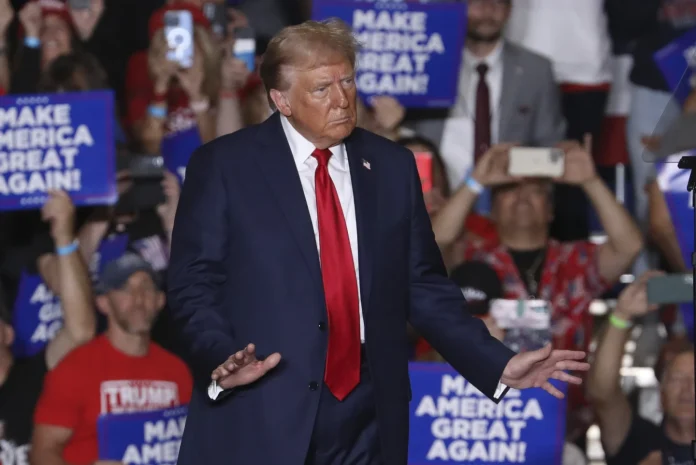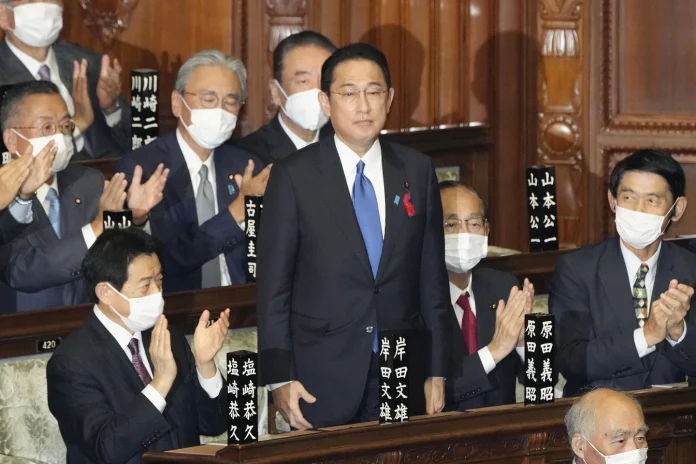If Ruben Gallego is going to give Democrats their fourth straight U.S. Senate victory in Arizona, he’s probably going to need support from an unlikely group: Donald Trump voters.
Gallego and his GOP rival, former television news anchor Kari Lake, are both targeting undecided Republicans in a contest that will test the strength of Trump’s coattails. Ticket-splitting voters are increasingly rare in an era when partisan loyalty reigns, but they could be central in determining which party controls the Senate.
For Gallego, that means winning over voters like Winfield Morris, a 62-year-old Republican farmer and rancher who plans to vote for Trump for president but can’t get behind his loyal ally in the Senate race.
“I don’t like Kari Lake and I’m not going to vote for her,” said Morris, who lives in southern Arizona and has businesses across the state. “I don’t think she has what it takes.”
Morris supported former U.N. Ambassador Nikki Haley over Trump and Pinal County Sheriff Mark Lamb over Lake in the GOP primaries. He said he was furious to see Lake attack the late Arizona Republican Sen. John McCain in her failed 2022 campaign for governor. Trump also has attacked McCain, but Morris said he doesn’t see Democrat Kamala Harris as a viable alternative.
Morris said he likes that Gallego was a Marine and may vote for him but wants to learn more about him. He’s also considering writing in a Republican he respects, such as Lamb, who got 40% of the vote in the Senate primary despite being vastly outspent and overshadowed by Lake.
Democrats have a difficult path to keep the Senate
Democrats’ difficult path to retaining control of the Senate relies on winning over Republicans in states so red, neither presidential candidate is putting much effort into winning them. But some of those races involve established incumbents who already have a record to run on.
An ad supporting Montana Sen. Jon Tester — one of the most endangered Democrats in the Senate, who has declined to endorse Harris — showcases Republicans crossing party lines.
“Jon got over 20 bills signed into law by President Trump,” one man says in the ad.
Trump is well positioned in Ohio, but the race between incumbent Democratic Sen. Sherrod Brown and Republican challenger Bernie Moreno could be more competitive.
The effort to win over ticket-splitters is harder for less established candidates, but some are trying. In North Dakota, longshot Democratic Senate candidate Katrina Christiansen released an ad this week narrated by a rancher who says he’s voting for Trump but not for Republican Sen. Kevin Cramer.
In swing-state North Carolina, where Republican Mark Robinson’s campaign for governor is struggling following a CNN report linking him to disturbing posts on an online porn site, the Trump campaign is counting on ticket-splitting in the opposite direction, hoping GOP voters who bail on Robinson will stick with the former president in a state he badly needs to win.
In Arizona, meanwhile, Gallego is hoping to replicate the model that has propelled Democrats to narrow statewide victories since Trump’s first victory, including Sens. Kyrsten Sinema and Mark Kelly and Gov. Katie Hobbs, who defeated Lake in 2022.
He’s getting plenty of help. Democrats so far have outspent Republicans on advertising by a wide margin on the race, according to AdImpact, which tracks campaign ad spending. As of Thursday, Democrats had spent $60.7 million on the race, compared to $16.4 million spent by Republicans. Democrats also have $35.7 million in spots reserved between now and Election Day, compared to $11.7 million reserved by GOP-affiliated groups.
Gallego’s strategy relies on Democrats keeping their own supporters united, getting a majority of independents and picking up a small but decisive share of Republicans by appealing to conservatives who dislike Trump.
“Especially in modern times, to have ticket splitters that big is extraordinary. But I think it’s entirely accurate,” said Mike Madrid, a California-based Republican strategist who has worked to defeat Trump. “They’re sticking more to Trump because he’s the top-of-the-ticket nominee, and losing the presidency is a lot different than losing a Senate seat.”
Republicans have had a hard time replicating Trump’s coalition
Celebrity candidates who are close to Trump but lack strong ties to the GOP establishment have had a hard time replicating Trump’s coalition, Madrid said. Television doctor Mehmet Oz and football legend Herschel Walker both lost Senate races two years ago. As a well-known local news personality, Lake fits the mold.
Both Lake’s and Gallego’s messaging reflect the importance of undecided Republicans to the outcome of the race.
Both are running ads focused on border security, almost exclusively so in Lake’s case. Gallego even gently rebukes the Biden-Harris administration in one ad playing in heavy rotation, saying, “Arizonans know — on the border, there is no plan.” He did not appear with Harris when she visited the Arizona-Mexico border on Friday.
And both Gallego and Lake are showcasing support from Republicans. For Gallego, it’s a businessman who says in ads he’s a Republican and calls the congressman a “man of principles.” For Lake, it’s Trump himself, as she reminds his supporters that he’s backing her. She’s been one of his most steadfast allies, embracing his lie that the 2020 election was stolen from him due to widespread fraud.
The cross-currents of divided loyalties among traditionally Republican groups often surface at campaign events. For example, the Arizona Police Association, which represents thousands of officers in the state, endorsed Gallego, citing his background as a Marine combat veteran. Just three days earlier, Trump called the group’s president, Justin Harris, to the stage to bestow an endorsement on the former president at a rally outside Phoenix.
Gallego hopes there’s more where that came from, and there’s some history to suggest that’s possible.
In 2020, Republican Senate candidate Martha McSally privately fretted that she was running behind with Trump voters, which turned out to be the case. While Trump lost Arizona by 10,457 votes — .03 percentage points — McSally lost by 78,806 to Kelly, indicating tens of thousands of voters split their tickets.
Some observers say Gallego fits the profile of the kind of candidate who could replicate the path forged by Kelly, a tough-talking former astronaut.
“Ruben is a legitimate tough guy,” said Stacy Pearson, a Phoenix-based Democratic strategist, who ran the successful 2016 campaign to oust Maricopa County Sheriff Joe Arpaio, which relied on voters who backed Trump at the top of the ticket. “He’s an Iraq War vet. He is a person who sincerely pulled himself up by his bootstraps, and that resonates very much with this Western state.”
___
Associated Press writers Jack Dura in Bismarck, North Dakota, and Amy Beth Hanson in Helena, Montana, contributed to this report.




